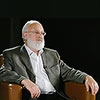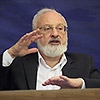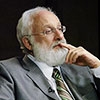 Question: What is unique about teaching integral approach to the elderly?
Question: What is unique about teaching integral approach to the elderly?
Answer: I think that they will receive it with greater understanding because a person who has already lived a lifetime understands to what extent one is not the master of one’s own life. It’s as if it passed by above him, commanding him, and not him being in command of it.
People of that age agree more with the fact that nature works on us, and now, when they don’t have that much time left to understand, realize, and possibly correct that in some way, they are more diligent, sensitive, and compassionate.
Besides, the enormous hard-won life experience gives a person a completely different approach to what is being offered. From the very beginning, a person is open to learning, so naturally, his participation in the studies is most amicable. We are offering a person to achieve harmony in that short segment of time that he or she has.
These are people who live and measure themselves not relative to some achievements, but relative to the end of life. Generally speaking, this constant subconscious sensation in a person determines his or her entire behavior.
And here is where we need to imbue the endpoint of their life with joy, attainment, and ascent towards a new state that exists beyond the end of corporeal life. We should give them a sensation that it’s as if they’re flying and about to crash into something, and suddenly a motor appears that carries them up above the obstacle. It is precisely a sensation of this possibility that will give them strength, and then, of course, it will be very easy for them to work in a group.
I hope that these groups will be a serious help to us because in principle, the more groups of this kind we can create, the easier it will be for us to include ourselves into all of humanity.
By the way, longevity inherent in our time (life expectancy is more than doubled compared to the previous centuries) means an accumulation of life experience by an individual. At some point, people lived 30 or 40 years and died young, without gaining any experience in life. From the ancient times and all the way until the 18th century, a person lived no longer than 35-40 years. It’s hard to believe now that there was once such a short life cycle. A person practically had no time to attain anything in life, grew old very quickly, and died. Everything somehow broke off very abruptly.
We need to take advantage of the fact that in our time, the developing ego offers us an opportunity, in accordance with its development, to simultaneously live through and internalize the experience and the point of view that develops in a person by the age of sixty and beyond. Today elderly people comprise the vast majority of humanity. We need to take advantage of this group, which is sympathetic to our methodology and its outcome, and through them create in all of humanity a certain correct background for integration.
Therefore, under no circumstances should we pass these groups by, although our usual automatic attitude towards this segment of the population is: “We’ll create all the necessary conditions so they wouldn’t bother us. Let them sit somewhere on a bench and calmly live out their life.” No, we need to build very powerful groups out of them, and they will disseminate this method, its usefulness, and a life-saving solution that it offers to mankind among their children and grandchildren.
Question: We know from experience that the majority of the elderly really love to tell the story of their life. Should we give them an opportunity to share their stories?
Answer: Only if it helps us in the capacity of a psychological example: What you related, what you saw, what you lived through. Naturally, the elderly love this, but their stories need to be accompanied by investigation and analysis: Why this happened, what it provided, what this should teach us today, and so on.
Elderly people passing time in various gatherings is their own business, but we need to take it into consideration and teach them how to relate to the lived experiment of life.
[65654]
From a “Talk on Integral Education” #4, 12/13/11
Related Material:
The “Golden Age” Groups
Equality In The Group?
A Person’s Age Is Not An Obstacle In Studying
Filed under: Education, Integral Upbringing, Q&A - No Comments →
 Kabbalists were always against memorizing, against learning by heart and against writing while studying, and so were the first scientists and scholars. After recording, you are limited by it. You put on paper or a computer what you should have put into yourself and used in order to change internally.
Kabbalists were always against memorizing, against learning by heart and against writing while studying, and so were the first scientists and scholars. After recording, you are limited by it. You put on paper or a computer what you should have put into yourself and used in order to change internally.










